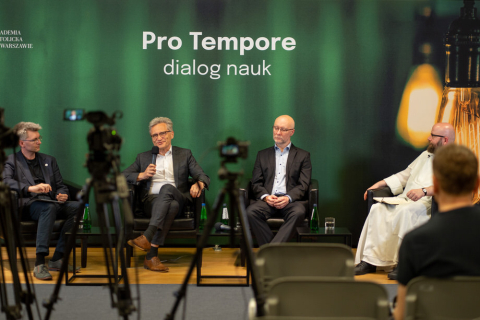Rev. Prof. Krzysztof Pawlina, Rector of the Catholic Academy in Warsaw and chairman of the Dialogue of Sciences Pro Tempore project, Prof. Zbigniew Gaciong, Rector of MUW, Prof. Przemysław Biecek of the Faculty of Mathematics and Computer Sciences at Warsaw University of Technology, Jan Borysowski, MD, PhD, of the Department of Clinical Immunology MUW, met at our university. The discussion was moderated by Father Dr. Janusz Pyda of the Thomistic Institute and the Catholic Academy in Warsaw.
– The subject of our debate is artificial intelligence. This topic is currently generating a great deal of excitement. From hopes that it will be a salvation for the world to fears that we may become the object of a machine revolt. I am confident that excellent panelists will resolve this issue – said Prof. Zbigniew Gaciong, opening the debate.
Most important applications
There is probably no medical discipline in which artificial intelligence could not find application. However, all experts agreed that it is currently most often used in radiology.
Prof. Gaciong recalled that during the Covid pandemic, the introduction of radiological algorithms greatly simplified the management of patients - it allowed to immediately see to what extent "the lungs are occupied" and quickly implement appropriate management.
– New technologies are also coming into play, which make it possible to automate the ultrasound examination. The apparatus itself does the examination and is able to analyze the obtained image - said Prof. Gaciong. The Rector also pointed to another area for the use of algorithms, namely pathology. There are already results that show that the evaluation of a pathological section made by a computer can be as accurate as the one made by a doctor.
Meanwhile, Jan Borysowski, MD, PhD, pointed to interesting applications of A.I. in biomedical research.
What about the doctor-patient relationship
Experts also wondered whether artificial intelligence could hinder the doctor-patient relationship.
– When talking about artificial intelligence in medicine, we often imagine a situation where there is nothing else besides the patient and the computer. Meanwhile, this happens very rarely - noted Prof. Przemysław Biecek. And he stressed that the computer most often helps the doctor. And it can help both in finding lesions and in presenting the diagnosis empathetically to the patient.
During the discussion, the question of whether artificial intelligence can be more effective than humans was also raised. The topic was taken up by Jan Borysowski, MD, PhD: – I am aware of two systematic reviews of studies in recent years that have been devoted to this question and involved radiology. They show that the effectiveness is comparable. However, there is one major problem that was raised in both of these systematic reviews. These are the methodological limitations of very many of the papers, such as their retrospective nature, the small number of clinicians used for comparisons, etc.
Ethical issues
Prof. Marek Krawczyk of the Department of General, Transplant and Liver Surgery, Dean of the Faculty of Medicine of the Polish Academy of Sciences, joined the panelists in the discussion.
– We have had tremendous progress in surgery – said Prof. Krawczyk.– And this is not only diagnosis, but also surgical treatment. I am not thinking of robots at which a human sits and operates. I'm thinking of a situation where a robot, based on a diagnosis, performs an operation. This robot will probably diagnose the patient very well and perform the operation. However, there is one "but." What to do when a problem or complication arises? Who is supposed to fix it? Will another robot appear? And where are the ethics? Who is responsible to that patient?
Ethical problems, precisely the problem of informed consent, were highlighted by Jan. Borysowski, MD, PhD:
– Obtaining it is a basic requirement, both legally and ethically, necessary for the application of some therapeutic intervention. Is the doctor obliged to give the patient information that artificial intelligence will be used? To what extent should he inform the patient? Some systems are very complicated. It is difficult to give informed consent to something that is not fully understood by the patient.
The experts also answered questions. One of them concerned whether the use of artificial intelligence in medicine should not be restricted after all. The panelists agreed that the development of A.I. cannot be stopped, but it is necessary to learn to use it in such a way that it is safe to do so.
– Science today should be humble, interdisciplinary and courageous. The world requires a humble approach, because we don't know everything. And on the other hand, it takes courage to face what is covered from us. Neither theology, medicine, theology nor engineering can deal with the world alone. We all have to work together - concluded the conference Rev. Prof. Krzysztof Pawlina.
